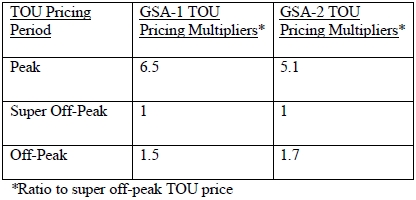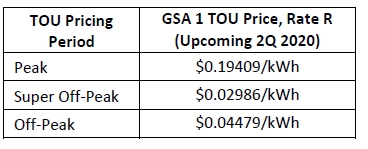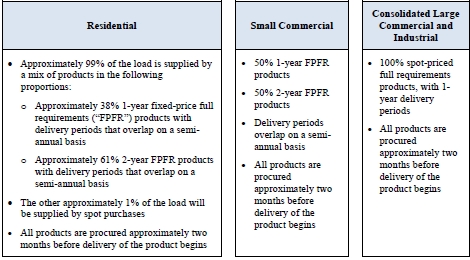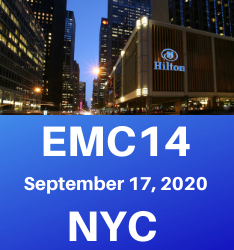|
|
|
|
|
PECO CAP Shopping Proposal Would Require Retail Suppliers To Adhere To Pricing Limits, Or Drop Customer, For Existing Shopping Customers Who Become CAP Customers Mid-Contract
The following story is brought free of charge to readers by EC Infosystems, the exclusive EDI provider of EnergyChoiceMatters.com
PECO has filed with the Pennsylvania PUC a proposed default service plan (DSP V) for the period from June 1,2021 through May 31, 2025, which includes, among other things, implementation of a shopping program for Customer Assistance Program (CAP) customers, and a new Time of Use generation rate option for non-shopping default service customers
CAP Shopping Program
Approximately 111,000 residential customers in PECO’s service territory -- almost 7% of
all PECO residential electric customers - participate in the Customer Assistance Program (CAP). Currently, these customers are not eligible to take supply from a competitive retail electric generation supplier
Consistent with the PUC's previously reported proposed policy statement on CAP customer shopping, PECO proposes to implement a CAP shopping program under which retail electric generation suppliers (EGS) may serve CAP customers, but, in order to do so, the EGS must charge CAP customers a rate for generation service that is at or below the PECO residential PTC at all times during the contract.
PECO said that its current schedule for posting its residential Price to Compare (PTC) accommodates EGS compliance with this ongoing CAP shopping price limit
In its petition, PECO said that, "PECO files its residential PTC forty-five days before the effective date,
which provides ample time for EGSs to develop CAP products, calculate any
change to a currently offered CAP rate, and provide notice to existing CAP
customers of any rate change."
PECO's proposed CAP program also includes proposed provisions for customers currently shopping with an EGS who then become a CAP customer.
PECO proposes that, "An EGS may continue to serve existing customers who subsequently enroll
in PECO’s CAP if the EGS complies with the pricing restrictions and other terms
set forth in the Supplier Tariff within two billing cycles of receipt of the
Company’s CAP Change Notice. If the existing EGS is not a CAP Supplier or
otherwise elects to discontinue service to the customer in accordance with Section
14 of the Supplier Tariff [EGS's Discontinuance of Customers], the customer will be transferred to default service,
effective on the next meter read date after the CAP Change Notice."
The PUC's proposed policy statement did not squarely address the issue of treatment of currently shopping customers who become CAP customers in the middle of a contract with an EGS
Concerning customers who become ineligible for CAP while in the CAP shopping program, PECO proposes that, "If a CAP Supplier has entered into a contract with a CAP customer and
subsequently receives a CAP Change Notice that the customer is no longer in the
CAP, the EGS has two options. First, the CAP Supplier may elect to maintain the
customer on the CAP rate until the end of the contract. Second, the CAP Supplier
may discontinue service in accordance with the notice provisions set forth in Section 14 of PECO’s Supplier Tariff and the terms and conditions of the
contract, just as with any other residential customer."
PECO also proposes to require that CAP Suppliers must use PECO’s 'bill-ready' EDC consolidated billing for
all shopping CAP customers.
"The use of EDC consolidated billing will allow the Company to
ensure that each customer’s CAP benefits are properly applied to customer charges and track
information regarding CAP customers to meet its on-going obligations to the Commission with
respect to universal service programs, including reporting on cost effectiveness and affordability," PECO said
Additionally, PECO proposes that, in order to participate in the CAP shopping program, EGSs must publish their CAP rates on PAPowerSwitch.com and
in a customer mailing (upon a customer’s request via EGS call centers), "to promote rate
transparency and help simplify the shopping process for CAP customers."
Concerning the expiration of a contract with a customer in the CAP shopping program, PECO proposes that, in accordance with the Proposed Policy Statement Order, a CAP customer will be
subject to the following end-of-term options: renew the contract with his or her
existing EGS at a new Plan-compliant CAP rate, switch to another supplier
offering a Plan-compliant CAP rate or return to default service. If a CAP
Supplier seeks to enter into a new agreement with a CAP customer at the end of
the term or revise an existing contract consistent with the Plan’s pricing
restrictions, the CAP Supplier must comply with the Commission’s notice
regulations at 52 Pa. Code § 54.10, PECO proposes. On the other hand, if an EGS elects to return
a CAP customer to default service upon contract expiration or cancellation of the
CAP customer’s contract, the contract cancellation and notice provisions
described in the EGS disclosure statement will apply. If the EGS disclosure does
not address cancellation and notices, the EGS must provide at least one notice
thirty days in advance of discontinuing service to the customer, PECO proposed
Also in accordance with the PUC's proposed CAP policy statement order, EGSs serving CAP
customers may not enter into contracts that impose early cancellation and
termination fees or other fees unrelated to generation service, PECO proposed
PECO would require that at least five EGSs provide notices of intent to participate in the CAP shopping program prior to commencing implementation. PECO said that implementation would then take one year from such threshold being reached
Time Of Use Default Service Generation Rate
PECO proposes a new Time of Use generation rate option for default service customers.
Under the Company’s proposed rate design, eligible default service customers will pay a
discounted rate for off-peak usage and a higher rate for peak usage relative to PECO’s standard fixed-price GSA.
The TOU generation rates will differentiate prices across three periods (peak, off-peak and
super off-peak) that are constant throughout the year based on price multipliers that are, "designed to
motivate shifting of usage from the higher-cost peak period to lower-cost off-peak periods."
Peak is defined as 2 p.m. – 6 p.m., Monday Through Friday, excluding PJM holidays
Super Off-Peak is defined as Midnight (12 a.m.) – 6 a.m., Every day
Off-Peak is defined as all other hours
PECO is proposing to set the TOU price multipliers for each procurement class
shown in the table below. These multipliers will remain constant during the DSP V term, and are not seasonal. These multipliers reflect the ratios calculated from average PJM PECO
zone spot market prices as well as the cost of capacity during peak and off-peak hours. PECO is
proposing to allocate the cost of capacity to peak and off-peak hours only, "to send cost-based
price signals and create larger price differentials that are more likely to motivate customers to
adjust the time of day they use electricity."
PECO will source both the standard and TOU default service for residential and
small commercial customers from the same supply portfolio used for standard default service for each procurement class
PECO will calculate the super off-peak price to provide a discount from the
standard GSA price, "in a way that offsets the higher peak and off-peak period prices and ensures
revenue neutrality." The revenue neutral super off-peak price for each procurement class will be
derived from the portion of total system kWh usage attributable to each TOU pricing period.
PECO said that it determined these percentages based on PJM energy market settlements over the most
recent historical five-year period (2014-2018). The peak and off-peak TOU prices are a factor of
multiplying the super off-peak price by the multiplier for the applicable procurement class and
TOU pricing period.
An illustrative example of the TOU rates, using the GSA rate effective as of March 1, 2020 as the baseline, is shown below:
The TOU Rates will be calculated on a quarterly basis, synchronized with the
GSA adjustment periods for the Residential and Small Commercial Classes. TOU customer kWh sales and costs will be included in the semi-annual
reconciliation of the over/undercollection component of the GSA for the entire
procurement class (i.e., Residential or Small Commercial). PECO said that its proposed reconciliation
process using a single E-Factor for each procurement class, "will help mitigate potential large
swings in GSA over/undercollections that could arise if customers switch between PECO’s
standard default service rate and TOU default service rate."
PECO’s TOU Rates will be
available to residential and small commercial default service customers with smart meters
configured to measure energy consumption in watt-hours. However, PECO is proposing to
exclude CAP customers from the residential TOU Rate at this time to avoid potential adverse
impacts on CAP benefits.
Eligible default service customers may enroll in PECO’s TOU Rates online or
through the Company’s care center. Participating customers will remain on the TOU Rate until
they affirmatively elect to return to PECO’s standard default service rate, switch to an EGS or
otherwise become ineligible.
PECO will establish a web page dedicated to the Company’s TOU Rate that will
summarize the new TOU Rates, describe tips and ideas on how to shift electricity
use, and provide information about how customers can determine the effect of the
TOU Rates on their monthly electricity bills.
PECO’s proposed communications plan will
also include a one-time bill insert and targeted outreach to the customers who
have registered EVs with PECO to introduce the new TOU Rates and instruct
customers on how to obtain more information.
PECO proposes to recover the costs to implement the new TOU rates, totaling approximately $3.8 million, from customers through the
administrative cost factor of the GSA
Default Service Procurements, Products, Rate Design
PECO generally proposes to continue its existing default service procurement and rate design, approved under DSP IV
One note is that PECO does propose to solicit new ten-year contracts for Solar Alternative Energy Credits (Solar AECs) to replace expiring 10-year contracts, but proposes an increase in the Solar AECs procured under such long-term contracts (discussed further below)
For the Residential Class, under DSP V, PECO proposes to continue to procure a
mix of one-year (approximately 38%) and two-year (approximately 61%) fixed-price full
requirements, load-following products. The remaining Residential Class load will be supplied
directly by PJM’s spot energy, capacity and ancillary service markets (approximately 1%). As in DSP IV, each of the Residential Class products will be procured approximately two months
prior to the beginning of the applicable delivery period
PECO proposes to continue to serve the Small Commercial class (100 kW and under) with equal
shares of one-year and two-year fixed-price full requirements products procured approximately
two months prior to delivery of the energy.
With respect to the Consolidated Large C&I class, PECO proposes to continue to
procure all default service supply through hourly-priced full requirements products on an annual
basis.
The chart below summarizes PECO's proposed supply portfolio:
Apart from the portion of Solar AECs procured under long-term contract, PECO will continue to satisfy its
AEPS obligations with respect to sales to default service customers by requiring each full
requirements default service supplier to transfer Tier I (including solar PV) and Tier II AECs to
PECO corresponding to PECO’s AEPS obligations associated with the amount of default service
load served by that supplier.
In addition, PECO will continue to allocate AECs obtained through
its AEC procurements to suppliers in accordance with the peak load of each customer class and
the percentage of load served by each supplier.
Concerning the long-term Solar AEC contracts, PECO is proposing two annual
solicitations in the first two years of the DSP V term for delivery of a total of 16,000 Solar AECs
(i.e., 8,000 Solar AECs in each solicitation in 2021 and 2022). This amount of Solar AECs is
expected to meet approximately 25% of PECO’s increased solar AEPS requirements under DSP
V. The remaining 75% of requirements will be met through AECs provided by
wholesale suppliers to meet the AEPS requirements associated with the
percentage of load served by each supplier.
The quantity of Solar AECs proposed to be procured under long-term contract is an increase versus current practice. Currently, PECO has
been purchasing 8,000 solar Tier I AECs annually from various agreements that will expire on May 31, 2020 or May 31, 2021.
PECO is also proposing to procure up to half of each year’s Solar AEC amount from solar
generating facilities located within its service territory consistent with a variety of stakeholder
goals, including the City of Philadelphia.
During DSP V, PECO will also
continue to be responsible for and will recover Network Integration Transmission Service and
Non-Firm Point-to-Point Transmission costs through its unbundled, bypassable TSC.
Consistent with current practice, other transmission charges will be recovered on a nonbypassable basis and are not included in the default service product (PECO also assumes these transmission costs for EGSs as well). PECO previously implemented a Non-Bypassable Transmission Charge (NBT) to recover the following PJM charges from all
distribution customers in PECO’s service territory: Generation Deactivation/RMR charges (PJM
bill line 1930) set after December 4, 2014; RTEP charges (PJM bill lines 1108 and 1115); and
Expansion Cost Recovery charges (PJM bill line 1730).
The default service rate for each of PECO’s procurement classes consists of a
generation (GSA) and transmission (TSC) component. The GSA currently recovers generation
supply costs, AEPS compliance costs, and ancillary service costs. The GSA also includes
administrative cost and working capital factors. The TSC recovers certain PJM charges for
transmission service PECO acquires on behalf of default service customers.
Currently, PECO adjusts its default service rates each quarter, with semiannual
reconciliation of the over/undercollection component of the GSA (the E-Factor).
PECO proposes to maintain three-month fixed prices for residential and small commercial customers, rather than moving to a six-month fixed price. In
accordance with a January 2020 Secretarial Letter, PECO assessed the benefits presented by
both a three-month and six-month default supply price projection period in the context of the
Company’s PTC history. "Based on this assessment, PECO believes its current approach
appropriately balances the responsiveness of the PTC to current market conditions and
fluctuations caused by billing cycle lag," PECO said
Consistent with current practice, PECO is seeking a waiver of the Commission’s regulations to continue semi-annual reconciliation of the over/undercollection component of the GSA, rather than using quarterly reconciliations
PECO proposes to maintain the DSP IV load
cap so that no supplier will be permitted to provide more than 50% of the default supply for any
one of PECO’s procurement classes at any point in time during DSP V.
Docket P-2020-3019290
ADVERTISEMENT Copyright 2010-20 Energy Choice Matters. If you wish to share this story, please
email or post the website link; unauthorized copying, retransmission, or republication
prohibited.
PECO Would Require EGSs In CAP Program To List CAP Rates (Mandated To Be At Or Below PTC) On PA Power Switch
PECO Proposes New Time Of Use Generation Rate Option For Default Service Customers
PECO Files Default Service Plan
April 1, 2020
Email This Story
Copyright 2010-20 EnergyChoiceMatters.com
Reporting by Paul Ring • ring@energychoicematters.com



NEW Jobs on RetailEnergyJobs.com:
• NEW! -- Energy Procurement Manager
• NEW! -- Channel Relations Manager -- Retail Supplier
• NEW! -- Senior Retail Energy Markets Pricing Analyst
• NEW! -- Energy Market Analyst -- DFW
• Senior Consultant - Competitive Energy Markets -- Houston
|
|
|
|









